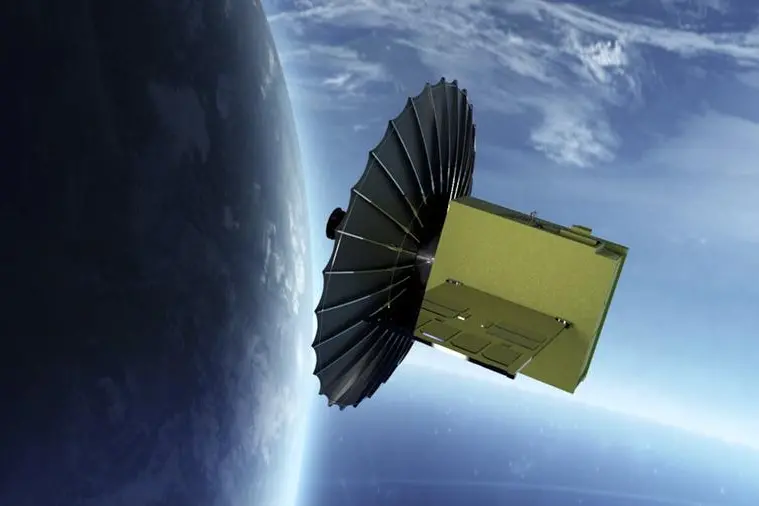PHOTO
Everyone loves exploring the night sky. There are several locations promoted as hotspots for stargazing in the UAE. While admiring the beauty of the skies, do you realise there are millions of hazardous space debris in Earth's orbit, with a vast chunk remaining untraceable?
Two Emirati experts from the UAE’s National Experts Programme (NEP) shed light on the urgency of debris mitigation to secure the future of space exploration.
Developed in 2019 under the directives of President Sheikh Mohamed bin Zayed Al Nahyan, NEP is a launch pad for UAE-based specialists, who strive to play a leading role in the transformation and future growth of sectors aligned with the UAE’s national priorities.
NEP fellow Abdulla Al Shehhi and alumna Fatima Al Shamsi, both from the UAE Space Agency, are urging global decision-makers to place space debris mitigation at the top of their agenda.
What is space debris?
Space debris or space junk are objects that are no longer active and disposed of as waste in space. These can be pieces of inactive satellites, rockets, debris from missiles. These objects range in size and could cause major damage in any collision with an orbiting space vehicle.
Space debris has been accumulating since the start of the Space Age in 1957. Since then, more than 6,300 rocket launches have successfully placed around 15,000 satellites into Earth’s orbit. Of these, nearly 10,000 remain in space, with an alarming one-third being inactive or non-functional.
As per estimates, these pieces are a range of trackable sizes, including 34,000 that are larger than 10cm, 900,000 pieces between 1 cm to 10 cm, and more than 128 million pieces under 1 cm. However, there are still roughly 131 million pieces of hazardous space debris that are untraceable, posing a potentially bigger threat given their unpredictability and high speed. Although their orbits eventually decay, the process can take years.
Risks for future missions
As the orbits around Earth become increasingly crowded with defunct satellites, rocket stages, and fragmented pieces from collisions, Emirati experts are urging nations to acknowledge the pressing challenges of space debris. The escalating prevalence of space debris in outer space poses substantial risks to operational satellites and human spaceflight, endangering the future of space exploration, they underlined
“As we witness a rapid growth in space activities, the potential threats posed by space debris cannot be underestimated,” Al Shehhi, head of strategic research at the UAE Space Agency, said.
Recently, Aarti Holla-Maini, director of the UN Office of Outer Space Affairs (UNOOSA), expressed her concern regarding the increase in space debris, highlighting the need to accelerate the implementation of mitigation guidelines. She reiterated the importance of sharing data and managing space activity safely as outlined in the 2019 UN guidelines.
“The UNOOSA director’s remarks are well in line with the UAE's commitment to mitigating space debris is a national responsibility and a contribution to the global effort to secure the future of space exploration for generations to come,” Al Shehhi noted.
Fatima Al Shamsi, head of the space policies and legislation section at the UAE Space Agency, said: “Director Holla-Maini’s recommendations perfectly reflect our mission and values at the UAE Space Agency. We have been proactively working on developing and evaluating our regulatory framework to guarantee the safety and sustainability of space activities.”
UAE’s proactive actions
In line with Holla-Maini’s recommendations and the UN guidelines, the UAE is implementing significant initiatives to address the concerns surrounding space debris.
In August 2022, the UAE Space Agency established ‘The UAE Space Debris Mitigation Guidelines’, offering recommendations to operators engaged in space activities and promoting measures to minimise the risk of generating new space debris during both operational and disposal phases. Space debris not only poses risks to space mission launches but acts as a challenge to sustainability, introducing a potentially hazardous nature to space. These new guidelines seek to mitigate immediate risks and extend to upholding the long-term sustainability of outer space.
Additionally, the UAE National Space Strategy 2030 provides a comprehensive framework covering local space industry activities. In line with this strategy, the UAE cabinet has issued multiple decisions, including a Compensation Regulation, which compels space agents to provide a compensatory guarantee regarding potential damages depending on specific activities undertaken, their level of risk, and the maximum potential losses that could arise.
“Through applying such rigorous guidelines, we strive to adhere to international best practices, as well as ensuring well-rounded efforts in space sustainability, avoiding what could be detrimental accidents,” Al Shehhi said.
Fatima Al Shamsi underscored: “Space debris mitigation remains a critical concern for all space missions, and we are continuously monitoring the implementation of our national guidelines to reduce space debris and avoid space object collisions.”
Copyright © 2022 Khaleej Times. All Rights Reserved. Provided by SyndiGate Media Inc. (Syndigate.info).





















